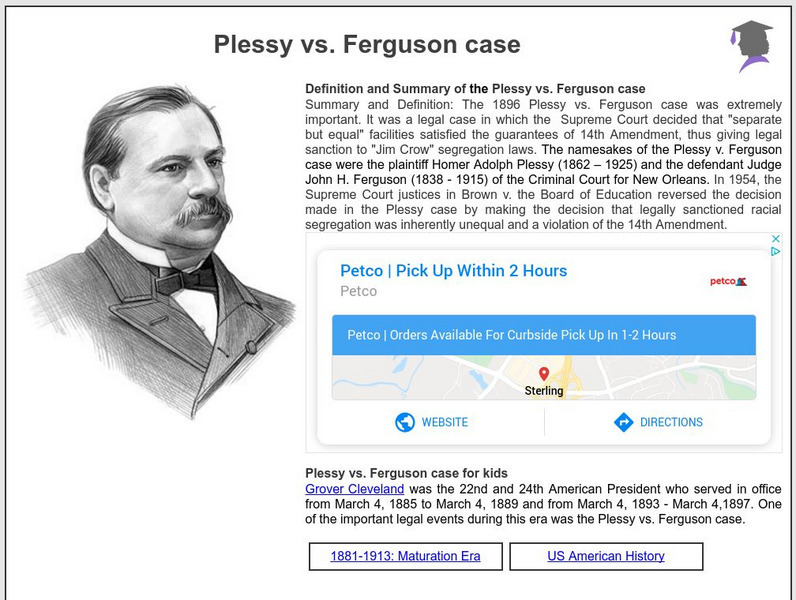Khan Academy
Khan Academy: Ap Us History: 1844 1877: Reconstruction: The Compromise of 1877
Discusses the Compromise of 1877 which gave the presidency to Rutherford B. Hayes and signaled the end of Reconstruction in the South. As a result of this act, federal troops withdrew from the South, and Jim Crow laws were passed by...
Khan Academy
Khan Academy: Ap Us History: 1865 1898: The Compromise of 1877
Explains how the Compromise of 1877 settled the contested 1876 presidential election, declaring Rutherford B. Hayes the winner while agreeing to withdraw federal troops from the South. This paved the way for the South to enact Jim Crow...
Khan Academy
Khan Academy: Ap Us History: 1865 1898: The South After the Civil War: Jim Crow
Explains how Jim Crow laws came to be created in the South and what it meant for African Americans. Discusses the Plessy v. Ferguson Supreme Court case, how its decision was eventually overturned, and the events that brought an end to...
Smithsonian Institution
National Museum of American History: Separate Is Not Equal: Jim Crow Laws
Find Jim Crow laws, see signs, and read restrictive covenants that restricted freedom of movement, housing, and use of public facilities by African Americans in the late 19th and 20 centuries.
Library of Congress
Loc: Civil Rights Jim Crow in America
A collection of primary source materials that reflect the Jim Crow laws in the United States. Includes analysis tools and teacher guides.
The History Cat
The History Cat: African Americans After the War
Provides a discussion of what life was like for African Americans after slavery ended, focusing on the Freedman's Bureau, Freedman schools, and the Ku Klux Klan.
Khan Academy
Khan Academy: The Montgomery Bus Boycott
Read about the action of Rosa Parks who refused to give up her seat on a bus in Montgomery, Alabama in 1955, triggering a massive bus boycott led by Martin Luther King, Jr. The boycott became the impetus for a Supreme Court ruling that...
CommonLit
Common Lit: Text Sets: Reconstruction to Jim Crow
After the Civil War and end of slavery, Americans had to decide how to integrate freed African Americans. Learn about the lives of African Americans from Reconstruction to the end of the prejudiced Jim Crow era. This collection includes...
CommonLit
Common Lit: Book Pairings: "Black Boy" by Richard Wright
Richard Wright, a black boy living in the Jim Crow South, travels north in hopes of escaping the violence and prejudice that rules his childhood. Selected (8) reading passages (grades7-12) to pair with "Black Boy" by Richard Wright....
CommonLit
Common Lit: Book Pairings: "I Know Why the Caged Bird Sings" by Maya Angelou
Maya Angelou recounts her coming of age story as a mature but apprehensive girl in the American South and California during the Jim Crow era. Selected (8) reading passages (grades 7-10) to pair with "I Know Why the Caged Bird Sings" by...
Oklahoma State University
Encyclopedia of Oklahoma History and Culture: Oklahoma Territory
A description of the Oklahoma Territory and its rapid growth in the late 19th century.
Khan Academy
Khan Academy: Us History: 1865 1898: Jim Crow
After Reconstruction, states in the South passed laws that barred African Americans from voting and segregated schools, restaurants, and public accommodations.
iCivics
I Civics: Jim Crow
Use primary documents and images to discover the ways state and local governments restricted the newly gained freedoms of African Americans after the Civil War. Compare, contrast, and analyze post-war legislation, court decisions...
Louisiana Department of Education
Louisiana Doe: Curriculum Hub: Ela Guidebooks: A Lesson Before Dying: Jim Crow Laws
Read "Jim Crow Laws" to establish your understanding of the text, and to see how they impacted African Americans.
Other
Minstrel Show: Contribution to Folk Music
Interesting essay page on the influence of minstrel shows on folk music. Provides historical connections and is accessible for research purposes.
Texas State Library and Archives Commission
Texas State Library and Archives Commission: Texas Joins the Battle: African American Women, 1890s
See photos that are representative of the lives of African-American women at the turn of the century and read about the discrimination black women and men faced: Jim Crow laws, poll taxes, and the "white primary" rule. A brief...
Ducksters
Ducksters: Civil Rights for Kids: Jim Crow Laws
On this site,students learn about the history of Jim Crow Laws including segregation in the South, example laws, grandfather clauses, black codes, and how they got the name Jim Crow.
Siteseen
Siteseen: American Historama: Plessy vs. Ferguson Case
Article provides an overview and detailed facts about the impact of the 1896 Plessy vs. Ferguson case on racial segregation.
Siteseen
Siteseen: American Historama: Jim Crow Laws
Learn about the Jim Crow Laws, Southern laws that legalized segregation.
Siteseen
Siteseen: American Historama: Racial Segregation History in the United States
This article contains numerous facts about black segregation history in the United States from the Civil War through the end of the Civil Rights Movement.
The History Cat
The History Cat: The Jim Crow Era: The Life and Death of Jim Crow
Looks at how Southerners continued to discriminate against blacks after the Civil War through Black Codes, or Jim Crow laws, which permitted practices such as segregation in public places and requiring literacy tests in order to vote.
Texas State Library and Archives Commission
Texas State Library and Archives Commission: The 1890s: Jim Crow Laws
In 1891, the Texas Legislature passed the Jim Crow law, which "required separate railroad coaches for African Americans." Learn why this was passed and given the name "Jim Crow."















